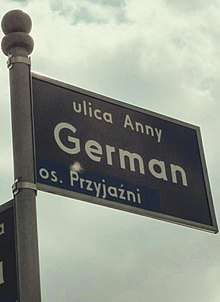Decommunization
Decommunization is the process of dismantling the legacies of communist state establishments, culture, and psychology in the post-communist states. It is sometimes referred to as political cleansing.[2] The term is most commonly applied to the former countries of the Eastern Bloc and the post-Soviet states to describe a number of legal and social changes during their periods of postcommunism.

In some states, decommunization includes bans on communist symbols. While sharing common traits, the processes of decommunization have run differently in different states.[3][4]
Decommunization organizations
Investigators and prosecutors
- Czech Republic – The Office of the Documentation and the Investigation of the Crimes of Communism
- Slovakia – The Institute of National Memory – Ústav pamäti národa (Sk)
- Estonia – The Estonian International Commission for Investigation of Crimes Against Humanity
- Germany – The Federal Commissioner for the Stasi Records (BStU)
- Hungary – The Committee of National Remembrance[5]
- Lithuania – The Lithuanian Center for the Research of Genocide and Resistance
- Poland – The Institute of National Remembrance — Commission for the Prosecution of Crimes against the Polish Nation
- Romania – The Institute for the Investigation of Communist Crimes in Romania
- Moldova – The Commission for the Study of the Communist Dictatorship in Moldova
- Ukraine – The Ukrainian Institute of National Remembrance
Prosecution of former communists
Lustration came to refer to government policies of limiting the participation of former communists, and especially informants of the communist secret police, in the successor political appointee positions or even in civil service positions.
Prosecutions of communist state leaders
- Afghanistan – Mohammad Najibullah was never convicted of a crime, but was nonetheless tortured and executed by the Taliban.[6]
- Bulgaria – Todor Zhivkov was initially sentenced to seven years in prison, but transferred to house arrest due to health reasons. He was later declared innocent by the Supreme Court of Bulgaria in 1996 and was released from house arrest shortly thereafter. He died as a free man one year later.[7]
- Cambodia – Kang Kek Iew is so far the only indicted Khmer Rouge leader, while Pol Pot and others lived free without charges.
- East Germany – Erich Honecker was arrested, but soon released and the proceedings against him were abandoned due to his ill health. He died as a free man in 1994. Several other members of the former East German government, such as Egon Krenz, were nonetheless convicted.
- Poland – Wojciech Jaruzelski avoided most court appearances, citing poor health, and was never convicted. He died as a free man in 2014 and was buried with full military honors at the Powązki Military Cemetery, attended by the incumbent president of Poland, as well as two former presidents.[8]
- Romania – Nicolae Ceaușescu was sentenced to death and shot by a firing squad.
Results
Communist parties outside the Baltic states were not outlawed and their members were not prosecuted. Just a few places attempted to exclude even members of communist secret services from decision-making. In a number of countries, the communist party simply changed its name and continued to function.[9]
Stephen Holmes of the University of Chicago argued in 1996 that after a period of active decommunization, it was met with a near-universal failure. After the introduction of lustration, demand for scapegoats has become relatively low, and former communists have been elected for high governmental and other administrative positions. Holmes notes that the only real exception was former East Germany, where thousands of former Stasi informers have been fired from public positions.[10]
Holmes suggests the following reasons for the turnoff of decommunization:[10]
- After 45–70 years of Communism, nearly every family has members associated with the state. After the initial desire "to root out the reds" came a realization that massive punishment is wrong and finding only some guilty is hardly justice.
- The urgency of the current economic problems of postcommunism makes the crimes of the communist past "old news" for many citizens.
- Decommunization is believed to be a power game of elites.
- The difficulty of dislodging the social elite makes it require a totalitarian state to disenfranchise the "enemies of the people" quickly and efficiently and a desire for normalcy overcomes the desire for punitive justice.
- Very few people have a perfectly clean slate and so are available to fill the positions that require significant expertise.
See also
- Anti-communism
- Communist crimes in Polish legal system
- Decommunization in Russia
- Decommunization in Ukraine
- Denazification
- De-Stalinization
- Golaniad
- Lustration in Poland
- Proclamation of Timișoara
- Vergangenheitsbewältigung
- Estonian International Commission for Investigation of Crimes Against Humanity
- Bans on Communist symbols
References
- "German zastąpi działacza komunistycznego". radiopoznan.fm (in Polish). Retrieved 18 May 2018.
- Jennifer A. Yoder (1999) "From East Germans to Germans?: The New Postcommunist Elites", ISBN 0-8223-2372-9,, pp. 95–97
- Lithuanian ban on Soviet symbols, BBC News, 17 June 2008, retrieved 3 June 2016
- Shevchenko, Vitaly (14 April 2015). "Goodbye, Lenin: Ukraine moves to ban communist symbols". BBC News. Retrieved 3 June 2016.
- "Greetings". The Committee of National Remembrance. Retrieved 27 March 2020.
- "Flashback: When the Taleban took Kabul". 15 October 2001. Retrieved 16 October 2019.
- "BBC News | Europe | Bulgaria's ex-communist leader dies". news.bbc.co.uk. Retrieved 16 October 2019.
- "Three presidents to attend Jaruzelski funeral". Polskie Radio dla Zagranicy. Retrieved 16 October 2019.
- After socialism: where hope for individual liberty lies. Svetozar Pejovich.
- Michael Mandelbaum (Ed., 1996) "Post-Communism: Four Perspectives", Council on Foreign Relations ISBN 0876091869
